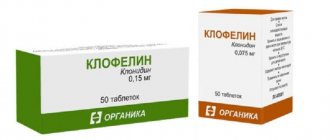Tablets in a blister and 2D structure of levothyroxine
Eutirox is an artificial substitute for the hormone thyroxine, which is synthesized by the thyroid gland. The substance is involved in tissue formation, metabolism, and the functioning of the cardiovascular and nervous systems. An overdose of Eutirox occurs due to incorrect selection of the dosage and method of administration of the drug. Intoxication causes adverse reactions and health problems.
Indications for use
The drug Euthyrox
is used for the following conditions: - euthyroid goiter, primary and secondary hypothyroidism; — for replacement therapy in patients who have undergone surgery on the thyroid gland, including resection of the thyroid gland and surgical treatment of thyroid cancer; - to prevent relapse after complete or partial removal of the thyroid gland; — in the complex therapy of diffuse toxic goiter, the drug Eutirox is used to achieve a euthyroid state when using thyreostatic drugs; - as a diagnostic tool for performing a thyroid suppression test.
First aid for poisoning with Eutirox
If symptoms of a drug overdose occur, the patient should be given first aid, and then call a doctor. Doctors will determine the patient’s condition; in case of severe intoxication, the patient will be hospitalized in the intensive care unit.
The first first aid that should be provided to the patient is to perform gastric lavage no later than an hour after the onset of symptoms of acute poisoning of the body. This must be done in a timely manner, because... later, most of the active substance will pass from the digestive tract into the blood and cause severe intoxication of the body.
- To lavage the stomach, the patient must drink 2 liters of water at room temperature and induce vomiting by pressing on the root of the tongue.
- Then you should take sorbents in order to remove the remnants of Eutirox from the stomach. Enterosgel, activated carbon, Polysorb are used as sorbents.
- If more than an hour has passed since the onset of symptoms of drug poisoning, and the doctors have not yet arrived, then you need to do a cleansing enema to eliminate the metabolic products of the drug from the intestines.
- The patient needs to drink plenty of fluids. In case of mild overdose, you can drink large quantities of still mineral water. This will reduce the effect of dehydration and promote rapid removal of the drug from the body.
READ Phenibut overdose
When emergency medical care arrives, doctors can transport the patient to the intensive care unit or endocrinology department of the hospital. There he will undergo the necessary procedures to remove toxins from the body, maintain vitality, and receive symptomatic therapy.
Mode of application
The dose of the drug Euthyrox
and the course of treatment are prescribed by the attending physician individually for each patient, depending on the nature of the disease and the individual characteristics of the patient.
For euthyroid goiter and to prevent relapse after surgical treatment of euthyroid goiter, patients are usually prescribed 75-200 mcg of levothyroxine per day. For hypothyroidism in patients under 55 years of age and with normal cardiovascular function, 75-150 mcg of the drug per day is usually prescribed. For hypothyroidism in patients over 55 years of age and/or those suffering from impaired cardiovascular function, an initial dose of 25 mcg is usually prescribed, then the dose is increased by 25 mcg every 2 months until a normal TSH level is achieved. In case of deterioration of the cardiovascular system, it is necessary to adjust cardiac therapy. For congenital hypothyroidism in children under 6 months of age, a daily dose of 10-15 mcg/kg body weight is usually prescribed. At the age of 6 months to one year, 6-8 mcg/kg body weight, at the age of 1 to 5 years, 5-6 mcg/kg body weight, at the age of 6 to 12 years, 4-5 mcg/kg body weight. Children over 12 years of age are usually prescribed 2-3 mcg/kg body weight once a day. For the treatment of thyrotoxicosis, in combination with other drugs, levothyroxine is prescribed at a dose of 50-100 mcg per day. For thyroid cancer, 50-300 mcg per day is prescribed as suppressive therapy. Before the thyroid suppression test, the drug is taken according to the following scheme: a month before the test, they begin to take 75 mcg per day, 2 weeks before the test, the dose is increased to 150-200 mcg per day. It is recommended to take the drug in the morning 30 minutes before meals. The daily dose is taken at a time, the tablet is swallowed whole, without chewing and washed down with a small amount of water. For young children, the tablet is dissolved in water until a fine suspension forms; the drug should be taken immediately after the tablet is dissolved, in the morning, preferably 30 minutes before the first feeding. For patients who have long suffered from hypothyroidism, the drug is prescribed carefully, using low initial doses. Typically, therapy begins with the appointment of 12.5 mcg per day, after which the daily dose is increased every 2 weeks by 12.5 mcg. In patients with long-term hypothyroidism, when using the drug Eutirox, it is recommended to regularly measure the level of TSH in the blood. For hypothyroidism resulting from complete or partial removal of the thyroid gland, therapy with Eutirox is carried out throughout life.
Patients' opinions about the drug
The opinions of patients who have been taking Eutirox for quite a long time are very ambiguous. A separate group of people say that the drug brought them back to life. All symptoms accompanying a lack of thyroid hormones have gone away, and patients feel absolutely healthy. However, there is a considerable percentage of those who cannot refuse to take the drug, and simply do not have the strength to take it due to the large number of side effects.
Some patients complain of an increased feeling of anxiety, manifested in tremors, poor sleep, a feeling of fear, and depression. Many people complain of a constant feeling of cold and low body temperature. Some patients say that taking the drug increases dry cough, the skin becomes dry and cracks. However, if there are strong manifestations of hypothyroidism, choose the lesser of two evils - take the drug.
For many expectant mothers, the leading doctor prescribes Eutirox during pregnancy. From some people the reviews are very positive, the condition is improving significantly. However, there are also those whose stomach reacts to taking the drug (constipation, constant nausea, lack of appetite), and herpes rashes appear.
Reviews about the drug for those wishing to lose weight are also mixed. The ladies are happy that the weight is falling off quite quickly. True, there is drowsiness and lethargy. In other patients, weight steadily increases while taking Eutirox.
Many patients write that taking the drug significantly improved test results, but their health worsened: lethargy, drowsiness appeared, and their legs hurt. Quite a large number of patients have worsened cystitis.
Contraindications
: Contraindications to the use of the drug Eutirox
are: increased individual sensitivity to the components of the drug; thyrotoxicosis in the absence of adequate therapy with thyreostatic drugs; acute myocardial infarction, acute myocarditis; adrenal insufficiency in the absence of adequate therapy. Use with caution in patients suffering from diabetes mellitus, dysfunction of the cardiovascular system and malabsorption syndrome.
In patients with such diseases, dose adjustment is necessary.
Side effects
In addition to the undoubted benefits in the treatment of diseases associated with insufficient production of thyroid hormones, the drug "Eutirox" has side effects. Its use can cause tachycardia (increased heartbeat), disrupt the rhythm of the heart and cause chest pain. The central nervous system may react to the drug with a disturbance in the general emotional background and insomnia. Manifestations such as significant weight loss, diarrhea, alopecia, impaired adrenal function in adults and impaired kidney function in children are quite possible.
Pregnancy
: If necessary, therapy with Eutirox
during pregnancy is continued. During pregnancy, an increase in the dose of levothyroxine may be required. However, taking the drug simultaneously with thyreostatic drugs during pregnancy is contraindicated due to the need to increase doses of thyreostatic drugs, which can penetrate the placenta and have a negative effect on the fetus. The excretion of the drug in breast milk is insignificant and, as a rule, does not have any effect on the child; however, taking Eutirox during lactation must be carried out under the supervision of the attending physician.
Summarizing
A fairly large percentage of those taking the drug Eutirox experience side effects to varying degrees. Some people feel a slight deterioration in their general condition, while others feel disgusting. However, a fairly large group of patients felt better and attribute such improvements to the start of taking Eutirox. In this regard, it is worth saying that the right to prescribe or cancel a drug belongs only to the doctor. If we talk about pregnant women, experts here believe that withdrawal will cause immeasurably more harm to the child than taking it. For those who decide to lose weight with the help of the drug "Eutirox", reviews of those taking this drug and recommendations from specialists will tell you that uncontrolled intake of hormones in an unknown dosage and by whom can cause serious harm to the body.
Interaction with other drugs
When used simultaneously, the drug Eutirox
enhances the effect of indirect anticoagulants and antidepressants. The drug increases the body's need for insulin and oral antidiabetic agents. When these drugs are prescribed simultaneously, dose adjustment of hypoglycemic drugs and regular monitoring of blood glucose levels is necessary. Eutirox, when used simultaneously, reduces the effectiveness of drugs from the group of cardiac glycosides. Cholestyramine, colestipol and aluminum hydroxide, when used simultaneously, reduce the absorption of levothyroxine in the gastrointestinal tract and lead to a decrease in its plasma concentrations. Asparaginase, tamoxifen and anabolic steroids alter the degree of binding of levothyroxine to plasma proteins. Phenytoin, clofibrate, salicylates and furosemide increase the amount of free levothyroxine in the blood. Estrogens may increase the need for levothyroxine.
Thyroid gland and its hormones
The thyroid gland, called the thyroid gland in the 17th century, is located in the anterior part of the neck, next to it are the parathyroid glands. This small organ is a vulnerable place from the point of view of causing any injury or infection. The two lobes are connected by an isthmus, shaped like a shield. The gland, with its main endocrine function, is a participant in various processes of the body. Without the work of an organ, it is impossible to imagine the growth and development of any organism.
The main role of the thyroid gland, as it is popularly called, is the production of hormones:
- thyroxine;
- tyrosine;
- Iodine tyranine.
Thyroxine stimulates the growth of the body as a whole, increasing resistance to high temperatures. It is produced from the intrauterine stage of human development. Without it, growth in height, development of mental abilities, and stabilization of the immune system do not occur. Under the influence of hormones, protection is enhanced - cells are more easily freed from foreign elements.
The production of hormones is regulated by higher glands - the hypothalamus and pituitary gland. The pituitary gland produces thyroid-stimulating hormone, which causes the thyroid gland to increase not only the production of iodothyranine and thyroxine, but also activates the growth of the gland itself. The hypothalamus is the control center where nerve impulses arrive. It produces hormones that regulate the activity of the pituitary gland.
Thus, under the guidance of the hypothalamus, throughout the day, the thyroid gland produces up to 300 micrograms of thyroid hormones, which ensure the development and construction of the nervous system. When the amount of hormones is excessive or insufficient, the nervous system responds with excitability or depression.
Overdose
: In case of an overdose of Eutirox
, patients experience symptoms of thyrotoxicosis, including tachycardia, heart rhythm disturbances, heart pain, tremors of the limbs, disturbances in sleep and wakefulness. In addition, patients experience increased anxiety, loss of appetite, sweating, and bowel movements. There is no specific antidote. In case of overdose, a reduction in the dose of the drug and discontinuation of levothyroxine for several days is indicated. In case of pronounced symptoms of overdose, drugs of the beta-blocker group are prescribed. After the symptoms of overdose disappear, therapy with Eutirox is resumed, starting with the minimum dose.
Signs of intoxication
An overdose of a hormonal drug can manifest itself in mild and severe forms. Symptoms of Eutirox poisoning:
- arrhythmia, tachycardia;
- gagging;
- nausea;
- angina pectoris;
- disruption of the menstrual cycle;
- abnormal heart rate;
- muscle weakness;
- digestive tract disorder;
- redness of the facial skin;
- increased body temperature;
- tremor of the limbs;
- neurosis, anxiety;
- weight loss;
- convulsions;
- insomnia;
- heavy sweating.
High dosages of the drug with long-term treatment lead to deterioration of the condition, in severe cases - to death. Death is possible if the body is poisoned over several years. People with hypersensitivity reported seizures when the individual tolerance threshold was exceeded.
How does taking eutirox affect a person’s weight?
Eutirox, also known as L-thyroxine, is designed to replace the function of the thyroid gland if necessary. When the thyroid gland does not produce its hormones in sufficient quantities, eutirox acts instead.
In this material, we will look at the relationship between the two concepts, which worries many. So, under the watchful eye, the connection between eutirox and weight.
According to the instructions for eutirox, it reduces weight. However, there are enough reviews on the Internet about weight gain when taking the drug. Who is right? In fact, both sides are right.
Eutiroks after entering the body is converted into triiodothyronine. This is one of the thyroid hormones. It has a long-term effect and an initial one. It is through its effects that the connection between taking eutirox and a person’s weight is made.
Effects of eutirox
Effects of the drug
Initial action
Appetite increases and fat synthesis accelerates. Moreover, both are the result of the influence of triiodothyronine, formed from this medicine. Thus, the acceleration of lipogenesis is not due to an increase in food consumption, but solely to the anabolic effect of the hormone. This initial effect of eutirox lasts quite a long time: 6-8 weeks.
Long lasting action
Eutirox increases basal metabolism, resulting in faster energy consumption.
Basic metabolism is all the body functions that keep us alive. Breathing, digestion, metabolic processes - all this requires energy and is included in the concept of basal metabolism. Thus, without any effort on the part of the person, the body quickly loses energy - and therefore weight.
All this is a long-term effect. At least 6 weeks after starting the drug (and usually much longer), fat synthesis is still increased, but its breakdown is accelerated. Gradually, the rate of fat breakdown exceeds the rate of its formation - and weight falls!
However, this is only part of the picture. Carbohydrates and the insulin produced in response to their intake interact with triiodothyronine and stimulate fat formation. That is, the weight is growing. But the appetite was increased and remained the same. This is why it is so important to limit carbohydrates while taking any thyroid hormones, not just eutyrox. Fats also have this effect to a somewhat lesser extent.
As is usually the case, this effect is largely individual, so some people may lose weight, but many gain weight.










